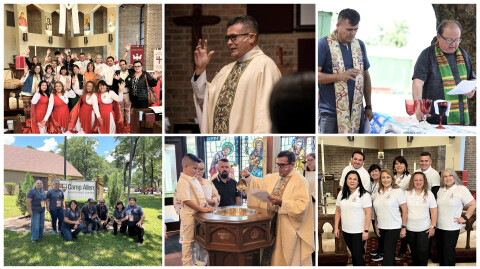Do we sin if we express anger at God? Are our verbal expressions of anger and sorrow a sign of lack of faith in the Lord? Are we being ungrateful when we express how isolated and abandoned by God we feel at times? The answer to these questions is a resounding “No!” All we need to do is look at the Biblical evidence to see a God who is deeply in love with humanity and who suffers with us when we groan under the weight of our fragile humanity. God in his infinite love and mercy has given us the Biblical language of Lament as a vehicle through which we can express our sorrow.
In 2 Samuel 1:17, we see David loudly lamenting the death of Saul and Jonathan. All throughout the Psalms we hear, “Record my lament; list my tears on your scroll -are they not in your record?” (Psalm 56:7-8;) “For I eat ashes as my food and mingle my drink with tears because of your great wrath, for you have taken me up and thrown me aside. My days are like the evening shadow; I wither away like grass” (Psalm 102:9-10;) “My God, my God, why have you forsaken me?” (Psalm 22:1). Job exclaims, “I am innocent, but God denies me justice. Although I am right, I am considered a liar; although I am guiltless, his arrow inflicts an incurable wound” (Job 34:4-5.) Habakkuk exclaims, “O Lord, how long shall I cry for help, and you will not listen? Or cry to you ‘Violence!’ and you will not save? Why do you make me see wrongdoing and look at trouble?” (Habakkuk 1:1-3.) These are a few of examples of lament from the Old Testament.
We see Jesus taking on the cry of Psalm 22, quoted above, as he hung from the cross for our redemption, “My God, My God, why have you forsaken me?” (Matthew 27:45.) Our God loves us so deeply that he does not cringe and back away from us when we experience moments of raw humanity. There is nothing that can make the Lord abandon or forsake us. How can a mother forget her nursing child? How can a loving father not protect his grieving child? How can God, who out of great love for humanity sent his only Son to our world for us, abandon the subjects of his redemptive rescue mission? How can God be so small that he would feel threatened or angered by our human laments? Just the opposite, God grieves with us in his own lament. Like a mother at the bedside of an ill child, God longs for the day when humanity will be restored to its original design.
God wants the world’s restoration for he knows that our humanity is disordered, and our frail bodies are subjected daily to the tyrannical and capricious assaults of our mortality: aging, physical and emotional pain, illness, financial reversals, the loss of relationships, and death. God wants all of us to experience the full redemption and restoration he has in store for all who believe in him. God does not purposely and capriciously afflict us with suffering, pain, and death. These things are the result of our fragile humanity: We are here for a season and then we make our exit, stage right. For some, death is the result of accidental events that are shockingly unexpected. For others, it is the result of humanity’s inhumanity to humanity, as in the case of the victims of violence, genocide, and repression. For others, it comes as a result of illness, including pandemic-related conditions. Rather than believing God causes our death, however, I chose to believe that God, in his infinite mercy, redeems and uses death for our eternal benefit. God waits at the other side for those who, having gone through the “great tribulation” of death, are ready to enjoy the eternal blessings set aside for the faithful.
In the meantime, what do we do with our pain?
(A) We talk it out. There is great healing in the telling of our story.
(B) We support each other, and we especially support the families and close friends of those who have died. We lift them up in prayer and become a source of comfort to them at this difficult time in their life.
(C) We allow ourselves to grieve, using the rich language of lament given to us in Holy Scripture. There is a tendency to fill our lives with activity as a way to numb the pain we feel. We must fight against this tendency and must allow ourselves to grieve properly. Our Lord will give us healing in due time.
(D) When the time is right, we continue to do the work our Lord has given us to do, knowing that the faithful live by faith (Habakkuk 2:4.)
God is in control of history. “The Lord is in his holy temple; let all the earth be silent before him.” (Habakkuk 2:20.)
Blessings to all,
Fr. Roman+





